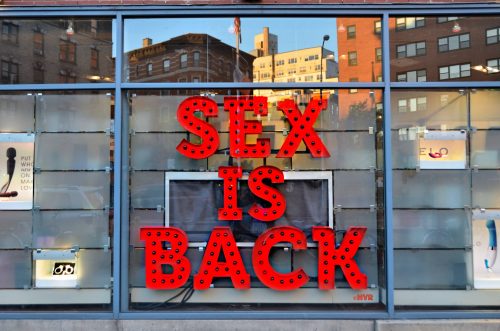Why the wellness world is all about menstrual, hormonal, and childbirth realness right now
The April 30 "happening" from Lauren Bille, Natalia Hailes, and Ashley Spivak is centered on conversations around sex, hormones, periods, reproductive health, and more.

There’s a pussy movement afoot—and it goes way beyond knit hats.
From menstrual realness to pelvic floor strengthening apps, sexual health is emerging as a key (and shame-free) point in discussions around wellness.

The latest sign that sex, birth, and reproductive cycles are as integral to your health as your heart rate? The topic now has its own all-day event, Cycles+Sex.
The April 30 “happening” (taking place in New York City) is the brainchild of Lauren Bille, co-founder of The Big Quiet, and Natalia Hailes and Ashley Spivak, birth doulas and founder of Brilliant Bodies, who felt that information around sexual health was seriously lacking—even among the most body-conscious women.
Cue a day of panels (full disclosure: Well+Good will be represented) diving into the messy—but necessary—facts, a marketplace spotlighting innovators who are reimagining the “sex sells” conceit, and empowerment opportunities (whether it’s feeling confident in getting intimate with yourself, or writing postcards to legislators).
Here, the Cycles+Sex creators explain the current state of sexual health—and why you should care.

What’s missing from the conversation around sexual health?
Ashley Spivak: Well to start, in many places, there are no conversations happening at all. Many states—we believe it’s 18 to date—don’t mandate sex ed in their schools, and even in states where classes are offered, they often preach abstinence and are focused solely on [sexually transmitted infection] prevention. So there’s that. And where there are conversations happening, what we feel is missing is that our sexual health doesn’t live in a vacuum. That’s a huge inspiration behind Cycles+Sex.
What do you consider to fall under the umbrella of “sexual health”?
AS: You can’t just look at one’s sexual health without also looking at one’s hormonal and menstrual health. For example, did you know that the cervix changes positions throughout the month? Did you know synthetic hormones from your birth control can be causing you vaginal dryness? The other major misconception is that sexual health is all about preventing disease and infection. Yes, obviously this is very important, but sexual pleasure has to be part of the sexual health conversation.
Do you view discussions around menstruation, hormones, reproductive health, and sex to be political in nature? In other words, is the personal truly the political here?
AS: Absolutely. One of our panels is literally called “Politics in our Privates.” Because policies being created are restricting our right, by law, to informed consent and refusal, and also taking away the decision-making power we should each have over our own bodies.
Plus if you look into the history of birth control, birth, and periods, it’s always been political—from when the “fancy doctors” first came back from Europe and took over midwifery care, to the sterilization and eugenics movements so tightly tied to the history of birth control.
These topics are clearly health-related, but do they fit into the broader world of wellness?
Natalia Hailes: It’s all connected! And it’s fascinating to use one’s cycle as the vehicle to learn more about one’s overall health. We bet your nutrition, meditation, and exercise practices will all be reflected. How many days you bleed, how much or how little, the color of your blood, the length of your luteal phase…. All of this can give really important clues as to how your inner ecosystem is doing overall and can become a great tool for you to start taking a more active role in your health.
You may have the best doctor in the world, but we’re the only ones with our bodies 24/7. So we need to start paying attention and learning how to decipher the many clues our bodies are giving us. We need to start thinking of ourselves as capable keepers of our health stories with the ability to make real change and we need to start demanding to be active participants in our care.
“We’re stuck with our bodies, no matter where we live, what our job is, who our partner is…At the end of the day it’s just us and us—so what can possibly be more important?”
What is the biggest misconception you see around sexual health, especially among young women?
NH: Misconception implies that people are thinking about it—and that’s part of the problem, because so many people aren’t! Again, sexual health isn’t just about STIs; it’s also about the pelvic floor and it’s also about pleasure. But the pleasure part can be really hard to tap into when there’s shame attached to sex, or if we aren’t heard saying, “No,” or are too bloated to be on top.
There does seem to be two somewhat divergent movements in the world of sexual health. One is super holistic, focused on quitting hormonal birth control or extolling the virtues of home births. The other is super futuristic, whether it’s high-tech sex toys or pelvic floor strengthening devices.
Lauren Bille: A big goal of Cycles+Sex is to present people with all the options, so they can ask all the questions firsthand and figure out what works best for them as unique individuals. We’re all different, so what works for one person may not work for another.
And we’re changing all the time, too! So what we really like today may not work in a few months. Underneath it all, what’s most important to us is that people shed all the “you shoulds” and really find their own way based on their own self-learning and needs, while understanding the potential outcomes of their choices and knowing they have support and options.
Ultimately, what do you hope people take away from Cycles+Sex?
LB: I want to raise up and empower women to have not shame, but [instead] to have autonomy, support, and courage to make decisions for themselves. This is one of the many areas that we are vulnerable. And since the wellness industry is on the rise and the political scene just became very conservative, it’s the perfect time to highlight sexual health and ride the wave that has come since the election: Give people information and tools to be more well when it comes to their bodies.
AS: Our panels and workshops are meant to get the conversation started—to inspire people to call their friends and say, “Wait, did you know you actually can’t get pregnant every time a penis ejaculates inside you?!” We’re stuck with our bodies, no matter where we live, what our job is, who our partner is…At the end of the day it’s just us and us—so what can possibly be more important?
Inspiration alert: The “period yogi” behind that viral video speaks out. If you want to bring sexy back, here’s how your workouts could rev up your libido.
Sign Up for Our Daily Newsletter
Get all the latest in wellness, trends, food, fitness, beauty, and more delivered right to your inbox.
Got it, you've been added to our email list.










